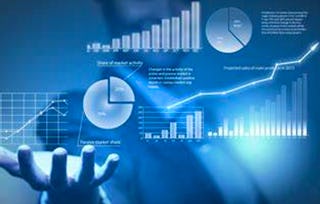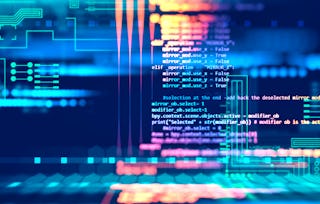Chaque fois que vous utilisez Google pour effectuer une recherche, chaque fois que vous utilisez Facebook, Twitter, Instagram ou tout autre SNS (service de réseau social), et chaque fois que vous achetez des produits à partir d'une liste de produits recommandés sur Amazon.com, vous utilisez un système de big data. En outre, la technologie du big data soutient chaque jour votre smartphone, votre smartwatch, Alexa, Siri et votre automobile (s'il s'agit d'un modèle plus récent). Les plus grandes entreprises du monde utilisent actuellement la technologie des big data, et toutes les entreprises ont besoin d'un soutien technologique avancé en matière de big data. En d'autres termes, la technologie big data n'est pas une option pour votre entreprise, c'est une nécessité pour sa survie et sa croissance. C'est donc le bon moment pour apprendre ce qu'est le big data et comment l'utiliser au profit de votre entreprise. Ce cours de 6 modules se concentre d'abord sur le classement des parts de marché de l'industrie mondiale du matériel, des logiciels et des services professionnels en matière de big data, puis couvre les principales lignes de produits et les types de services des grandes entreprises de big data dans le monde. Ensuite, les conférences se concentrent sur la façon dont l'analyse des big data est possible en se basant sur les trois technologies big data les plus populaires au monde : Hadoop, Spark et Storm. La dernière partie se concentre sur la fourniture d'une expérience sur l'un des systèmes d'analyse statistique de big data les plus célèbres et les plus largement utilisés dans le monde, IBM SPSS Statistics. Ce cours a été conçu pour vous préparer à mieux réussir la planification stratégique des entreprises dans l'ère du Big Data qui s'annonce. Bienvenue dans le monde étonnant des Big Data !

Big Data Technologies émergentes
Saisissez l'occasion de faire des économies ! Bénéficiez de 40 % de réduction sur 3 mois de Coursera Plus et d'un accès complet à des milliers de cours.

Big Data Technologies émergentes
Ce cours fait partie de Spécialisation "Technologies émergentes : Des smartphones aux technologies de l'information et de la communication (IdO) en passant par les données massives (Big Data)"

Instructeur : Jong-Moon Chung
33 199 déjà inscrits
Inclus avec
318 avis
Compétences que vous acquerrez
- Catégorie : Market Share
- Catégorie : Data Processing
- Catégorie : Statistical Analysis
- Catégorie : Big Data
- Catégorie : SPSS
- Catégorie : Scalability
- Catégorie : Data Analysis Software
- Catégorie : Business Analytics
- Catégorie : Real Time Data
- Catégorie : Analytics
- Catégorie : Distributed Computing
- Catégorie : Business Strategy
Outils que vous découvrirez
- Catégorie : Apache Spark
- Catégorie : Apache Hadoop
Détails à connaître

Ajouter à votre profil LinkedIn
Découvrez comment les employés des entreprises prestigieuses maîtrisent des compétences recherchées

Élaborez votre expertise du sujet
- Apprenez de nouveaux concepts auprès d'experts du secteur
- Acquérez une compréhension de base d'un sujet ou d'un outil
- Développez des compétences professionnelles avec des projets pratiques
- Obtenez un certificat professionnel partageable

Il y a 6 modules dans ce cours
Obtenez un certificat professionnel
Ajoutez ce titre à votre profil LinkedIn, à votre curriculum vitae ou à votre CV. Partagez-le sur les médias sociaux et dans votre évaluation des performances.
Instructeur

Offert par
En savoir plus sur Gestion des données
 Statut : Prévisualisation
Statut : Prévisualisation Statut : Prévisualisation
Statut : PrévisualisationO.P. Jindal Global University
 Statut : Essai gratuit
Statut : Essai gratuitIllinois Tech
 Statut : Essai gratuit
Statut : Essai gratuitYonsei University
Pour quelles raisons les étudiants sur Coursera nous choisissent-ils pour leur carrière ?

Felipe M.

Jennifer J.

Larry W.

Chaitanya A.
Avis des étudiants
- 5 stars
79,68 %
- 4 stars
14,37 %
- 3 stars
2,81 %
- 2 stars
1,25 %
- 1 star
1,87 %
Affichage de 3 sur 318
Révisé le 11 juin 2020
Amazing introduction course. I want to learn more about this fascinating area.
Révisé le 25 sept. 2020
good course get lot of knowledge how data is processed online
Révisé le 15 nov. 2020
Nice course, it gave me good idea on big data technologies. looking forward to do more courses on big data

Ouvrez de nouvelles portes avec Coursera Plus
Accès illimité à 10,000+ cours de niveau international, projets pratiques et programmes de certification prêts à l'emploi - tous inclus dans votre abonnement.
Faites progresser votre carrière avec un diplôme en ligne
Obtenez un diplôme auprès d’universités de renommée mondiale - 100 % en ligne
Rejoignez plus de 3 400 entreprises mondiales qui ont choisi Coursera pour les affaires
Améliorez les compétences de vos employés pour exceller dans l’économie numérique
Foire Aux Questions
Plus de questions
Aide financière disponible,
¹ Certains travaux de ce cours sont notés par l'IA. Pour ces travaux, vos Données internes seront utilisées conformément à Notification de confidentialité de Coursera.

